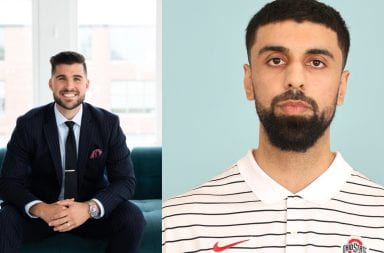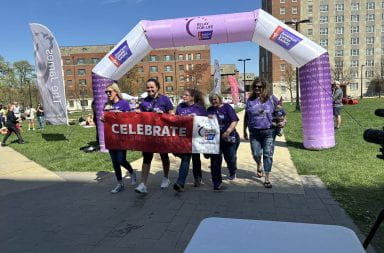
Aspiring to advance anti-racism dialogue in health care through creative research methods, MURALS is a student organization dedicated to researching healthcare disparities. Credit: Amani Bayo | Lantern Reporter
What started as an unforgettable undergraduate experience for third-year in medicine Onaopepo Kola-Kehinde led to the foundation of the Multicultural University Research and Leadership Symposium student organization dedicated to research on health care disparities, he said.
With a focus on improving patient care, Kola-Kehinde said MURALS is a convention for participants to present alternative styles of research surrounding inequalities in health care. He said it allows medical students and professionals to interact and share their research findings with one another creatively, not limiting themselves to clinical science presentations.
“MURALS is an opportunity for us to provide evidence-based, educational, anti-racist practices to highlight health care disparaties that exist,” Kola-Kehinde said. “So, somebody can create creative visual pieces, performing arts, audio, visual pieces, performances, creative writing, poetry.”
Kola-Kehinde said he was inspired to bring MURALS to the College of Medicine in summer 2020 after participating in a similar organization at Colorado State University as an undergraduate. Kola-Kehinde said participating taught him research can be a creative outlet for students to open further dialogue in health care.
“Knowing that I wanted to go to medical school, I knew that I needed to do research of some kind,” Kola-Kehinde said. “I’ve seen someone do a spoken word at CSU, I’ve seen somebody create a short music video. I actually watched a girl — she did a tutorial on makeup — and people in the crowd loved it.”
Kola-Kehinde said MURALS is not only an opportunity for medical students to fulfill their research requirements but is a space to discuss what healthcare imbalances look like to certain individuals. He said MURALS offers alternate ways for healthcare providers to share their findings.
“It opens this idea of, there’s another way of thinking about interactions with human beings within health care,” Kola-Kehinde said.
Kola-Kehinde said MURALS hopes to enhance student engagement in the research process while also looking into the different ways healthcare providers can improve equity in patient care.
“There’s this weird niche where certain students love research but other students don’t,” Kola-Kehinde said. “So this is our way of, kind of, saying, ‘Let’s emphasize diversity and equity of thought and learning — give students another platform to show their research not limited to basic science or clinical science.’”
Faculty advisor of MURALS and associate professor of OB-GYN Dr. Brett Worly said although MURALS is still in its youth, he is optimistic the organization will help medical students better understand the importance of racial health care disparities, specifically the disproportionate infant mortality rate for Black women.
“Awareness is one key component, and I think MURALS is pushing that,” Worly said. “We need to continue to shine a light in this area so we can better understand why it happens, how it happens and then, most importantly, what we can do to fix it.”
Worly said MURALS is not an immediate solution to racial health care inequalities but is a step in the right direction to making these conversations more common in the medical field.
“It’s going to take literally generations to correct these racial health care disparities, so the fact that MURALS exists means there are going to be health care providers out in the world who are going to be our advocates, who are going to be our partners and proactively start working on reducing racial health care disparities,” Worly said.
Napiera Shareef, a third-year in medicine and co-founder and vice president in design and development of MURALS, said the organization aims to engage with different cultures and offer a platform to discuss their diverse experiences in health care.
“We don’t necessarily get exposure to all the cultures we get to work within our community,” Shareef said. “Events like MURALS, it makes it fun. We’re doing song and dance where you can incorporate your hobbies and what you’re passionate about and then also bring in conversations about issues you are aware of.”
Kola-Kehinde said although MURALS has yet to host its first conference due to COVID-19, the organization has created modules for students to discuss imbalances they’ve noticed with race and health care.
Shareef said MURALS plans to hold its first symposium in the spring and hopes to reach universities and researchers across the country.
“My goal would be to expand this program, so we are able to invite multiple students, so it is a staple event that the College of Medicine is able to host every year,” Shareef said.


